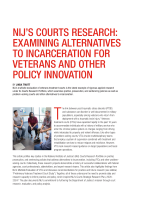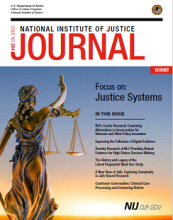Social and Behavioral Science
Assessing the Transnational Criminal Capacity of MS-13 in the U.S. and El Salvador
Specific theories of crime? A longitudinal assessment of the competing effects of psychopathy and self-control
Reentry Research at NIJ: Providing Robust Evidence for High-Stakes Decision-Making
NIJ's Courts Research: Examining Alternatives to Incarceration for Veterans and Other Policy Innovation
NIJ Journal Issue No. 284: Focus on Justice Systems
Recruiting and Retaining America's Finest: Evidence-Based Lessons for Police Workforce Planning
Preventing Repeat Incidents of Family Violence: A Randomized Field Test of a Second Responder Program in Redlands, California
What Does Gunshot Detection Technology Tell Us About Gun Violence
Prediction is Local: The Benefits of Risk Assessment Optimization
Evaluation of the Olweus Bullying Prevention Program in US Urban Middle Schools Using a Multiple Baseline Experimental Design
Female Reentry and Gender-Responsive Programming: Recommendations for Policy and Practice
For Spanish-Speaking Survivors of Intimate Partner Violence, Some Measures of Economic Empowerment are Lost in Translation
Evaluation of the Enhanced Collaborative Model to Combat Human Trafficking, Technical Report
Promising Practices from Victims Services Providers' COVID-19 Response: Protecting Victims and Those Who Serve Them
Promising Practices from Community Corrections Organizations’ COVID-19 Response: Ensuring Safety During Community Supervision
Promising Practices from the Institutional Corrections System's COVID-19 Response: Managing Safety and Security on the Inside
Promising Practices from the Court System's COVID-19 Response: Ensuring Access To Justice While Protecting Public Health
Promising Practices from Law Enforcement’s COVID-19 Response: Protecting the Public
The U.S. Criminal Justice System in the Pandemic Era and Beyond: Taking Stock of Efforts to Maintain Safety and Justice Through the COVID-19 Pandemic and Prepare for Future Challenges
Trauma in Schools - Roundtable Discussion, NIJ Virtual Conference on School Safety
On February 16-18, 2021, the National Institute of Justice hosted the Virtual Conference on School Safety: Bridging Research to Practice to Safeguard Our Schools. This video presents a roundtable discussion from the conference.
See the YouTube Terms of Service and Google Privacy Policy
School Safety Implementation Challenges - Roundtable Discussion, NIJ Virtual Conference on School Safety
On February 16-18, 2021, the National Institute of Justice hosted the Virtual Conference on School Safety: Bridging Research to Practice to Safeguard Our Schools. This video presents a roundtable discussion from the conference.
See the YouTube Terms of Service and Google Privacy Policy
Impact of COVID-19 on School Safety Research - Roundtable Discussion, NIJ Virtual Conference on School Safety
On February 16-18, 2021, the National Institute of Justice hosted the Virtual Conference on School Safety: Bridging Research to Practice to Safeguard Our Schools. This video present a roundtable discussion from the conference.
See the YouTube Terms of Service and Google Privacy Policy






